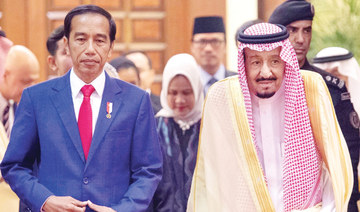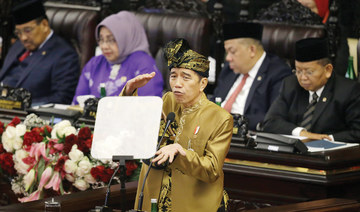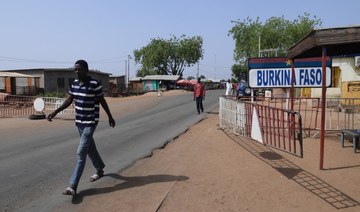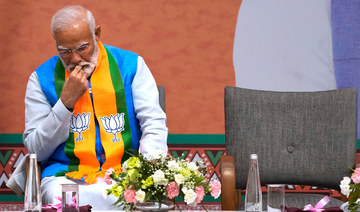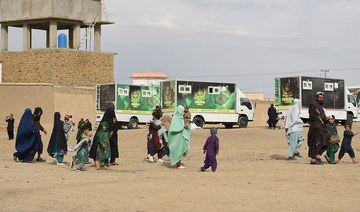JAKARTA: Indonesians always find new ideas for celebrating the Aug. 17 Independence Day. While the most common celebration is a simple raising of the national flag, it has become a tradition for people to do it in extreme places, such as the top of a mountain. In a vast archipelago that stretches 5,245 kilometers along the equator, Indonesian thrill-seekers who want to raise the flag on high are spoilt with options. With 500 mountains, of which 127 are active volcanoes and 22 are showing increased signs of activity.
Miena Muzdalifah, a mountain climber from Bandung, West Java, had her first high-altitude flag-raising moment in 2018 on Mount Hawu, a limestone mountain in Padalarang, west of Bandung. It was part of a simultaneous flag-hoisting ceremony in four compass directions that surround Bandung that her group, the Bandung Mountain Climbers Community, held last year.
“There was a special sense of pride to be able to raise the red-and-white (flag) at a high altitude. We had to undergo a certain process to read the limestone cliff’s summit,” Miena told Arab News. “It was a great feeling and it boosted my sense of nationalism and patriotism,” she added.
Miena said the group plans to celebrate Indonesia’s 74th Independence Day by having a flag-hoisting ceremony at a 2,088-meter elevation on the Soleh Peak of Mount Jampang in Garut district, south of Bandung.
The high enthusiasm to celebrate Independence Day by climbing a mountain, especially the most popular ones and those located in national parks, has resulted in such an excess of climbers that park managements have to impose quotas. The limit fills up so quickly that climbers have to book online far ahead of their trip.
Mount Rinjani in Lombok Island, a 3,726-meter-high active volcano and the second-highest mountain in Indonesia, imposed a quota of 500 climbers per day. The restriction took effect after all four trails on the mountain were reopened for climbers on June 14. They had been closed following the 6.4-magnitude earthquake struck the island in July 2018.
“We’re not giving out more places for climbers, even though enthusiasm is high during the Independence Day holiday,” Sudiyono, head of Mount Rinjani National Park, told Arab News.
The mountain is also popular with foreign hikers, who have made up 80 percent of its climbers since the reopening, Sudiyono said.
NUMBERS
5,245km - The length of the Indonesian archipelago that straddles the equator.
500 - Mountains in Indonesia.
127 - Active volcanoes that dot the archipelago from Sumatra in the west to Papua in the east.
4,884m - The 7 highest summits in Indonesia that start from the 2,278-meter Mount Bukit Raya in Kalimantan to the 4,884-meter Mount Jayawijaya in Papua.
12 - The youngest age of an Indonesian climber to climb the seven summits.
2,088m - Height of one of this year’s Independence Day ceremonies.
Last year, rescuers had to evacuate 1,226 climbers, including 696 foreigners, who were stranded in various spots on the mountain, including its iconic crater lake, Segara Anak, due to landslides triggered by the powerful quake.
“It was always very crowded with climbers celebrating independence each year. After the earthquake, we have been improving our climbing procedures. We want to maintain manageable numbers for safety and for conservation purposes,” Sudiyono said.
Rahman Mukhlis, secretary-general of the Indonesia Mountain Guide Association, has had the chance to celebrate Independence Day on two of Indonesia’s seven highest summits, Mount Rinjani and Mount Latimojong, a 3,478-meter-high non-volcanic mountain in South Sulawesi.
“When we climb mountains, we get to know more about our country. We gain a better understanding of our sociocultural environment through interacting with the locals and seeing first-hand our country’s beautiful nature. We see a different view from above,” Rahman told Arab News.
Dody Permana, a long-time mountain climber, had his Independence Day moment years ago on Java’s highest mountain, Mount Semeru, which sits 3,676 meters above sea level in East Java province and is one of Indonesia’s seven highest summits.
“The Independence Day holiday is always a good opportunity to climb together with a group of friends. It feels heroic when have a flag-raising ceremony in an unusual place, such as the top of a mountain,” Dody said.
“Almost all the most popular ones would be overcrowded with climbers during the holiday, except some that have imposed a quota for climbers,” he added.
Mount Semeru used to host thousands of climbers for Independence Day celebrations. But since May, the Bromo Tengger Semeru National Park has imposed a quota of 600 climbers per day after months of closure following intense rainfall at the height of the rainy season in January.
Lanjar Sayekti, who works at the national park office, told Arab News that quotas for climbers in Semeru on the Independence Day weekend are full up.
“Mount climbing is a good way to gain a deeper feeling of nationalism and boost patriotism, especially on Independence Day,” Rahman said.






